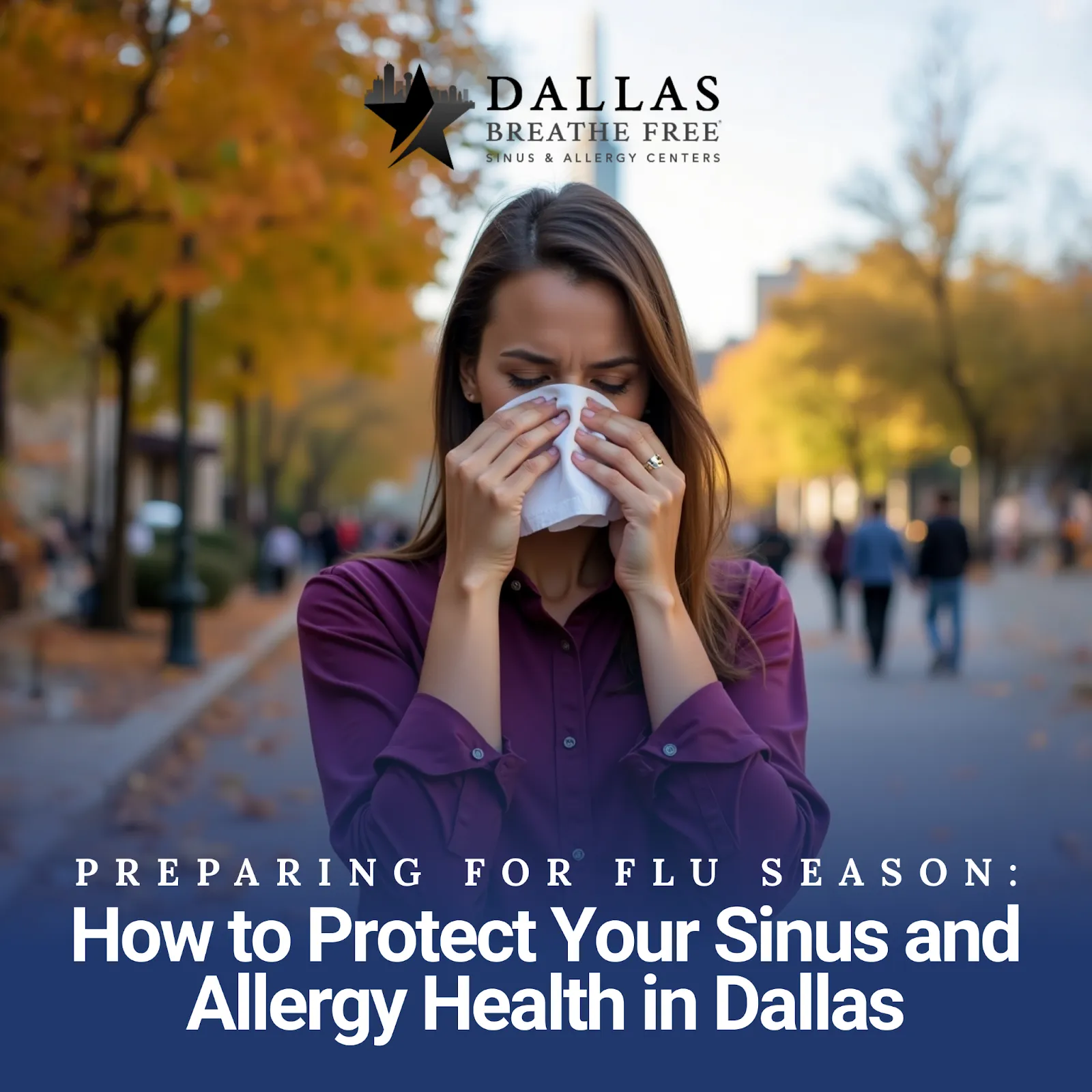Preparing for Flu Season: How to Protect Your Sinus and Allergy Health in Dallas
Every year, flu season brings more than just coughs and fevers. For many Dallas residents, it also means sinus pressure, congestion, and allergy flare-ups. When your sinuses and immune system are already sensitive, the flu may worsen existing sinus inflammation and, in some cases, lead to secondary infections.
At Dallas Breathe Free, we see this cycle often during the fall and winter months. The good news? With the right steps, you can protect both your immune system and your sinus health before flu season peaks. Here’s how to get ahead of it.

Why Sinuses Struggle During Flu Season
When your body fights off a virus like the flu, inflammation often spreads to your nasal passages and sinuses. This swelling may block drainage and increase the risk of secondary bacterial infection. The result? Secondary sinus infections, painful pressure, and weeks of discomfort.
For those who already deal with allergies, the challenge is even greater. Dallas’s fluctuating weather—cold fronts one week, warmer days the next—means allergens and viruses often overlap. That’s why it’s so important to think about flu season Dallas sinus health as one connected issue.
Dallas Flu Season Tips for Protecting Your Sinuses
The key to staying healthy is a mix of prevention, daily care, and knowing when to seek help. Here are some practical strategies:
1️⃣ Stay on Top of Allergies
Allergies weaken your sinuses and make it harder for your body to fight infections. Managing them before flu season reduces your chances of complications. Use antihistamines, saline rinses, or allergy treatments recommended by your doctor to keep inflammation down.
2️⃣ Prioritize Hydration
Dry winter air and indoor heating can thicken mucus, making congestion worse. Drinking plenty of water, herbal teas, or clear broths keeps your sinuses moist and helps your body flush out germs.
3️⃣ Practice Good Hygiene
Flu viruses spread quickly in schools, offices, and public spaces. Reduce exposure by:
- Washing your hands regularly
- Avoiding close contact with sick individuals
- Disinfecting frequently touched surfaces
Small habits go a long way during Dallas flu season.
4️⃣ Support Your Immune System
Healthy routines matter. Aim for:
- 7–9 hours of sleep each night
- A balanced diet rich in fruits and vegetables
- Regular movement, whether it’s walking, yoga, or light exercise
These steps keep your immune system strong and better prepared for flu and allergies in Lakewood, Uptown, or North Oak Cliff.
5️⃣ Use a Humidifier
Dallas winters can be surprisingly dry, which irritates nasal passages. A humidifier keeps indoor air at a comfortable level, protecting your sinuses from drying out and lowering the risk of infection.
When to See a Sinus and Allergy Specialist in Dallas, TX
Even with good habits, some people develop ongoing sinus issues during flu season. Signs you may need help from a sinus and allergy doctor include:
- Sinus infections lasting longer than 10 days
- Facial pain or pressure that keeps returning
- Constant congestion, even when you’re not sick
- Relying on nasal sprays or decongestants without lasting relief
We offer a range of diagnostic and treatment options that may help patients manage recurring sinus issues more effectively. From allergy testing to minimally invasive sinus procedures, our goal is to provide long-term relief so you don’t spend every winter battling the same symptoms.
Take Charge of Your Sinus Health This Season
Flu season doesn’t have to mean weeks of congestion, sinus pain, and missed activities. With preventive steps, strong immune support, and the right medical care, you can protect your health and enjoy the season with fewer setbacks.
📞 At Dallas Breathe Free, we’re here to help you prepare with personalized care plans built for North Texas residents. If sinus infections and allergies are a yearly struggle, don’t wait until you’re already sick—schedule your appointment today at our Dallas sinus clinic to explore personalized options for sinus and allergy care.
Work with a sinus specialist to explore strategies for reducing your symptoms this flu season.
%201.svg)


.webp)